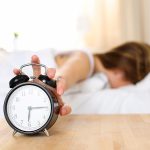Sleeping and the brain
Sleep is food for the brain. During sleep, important body functions and brain activity occur. Skipping sleep can be harmful — even deadly, particularly if you are behind the wheel. You can look bad, you may feel moody, and you perform poorly. Sleepiness can make it hard to get along with your family and friends and hurt your scores on school exams, on the court or on the field. Remember: A brain that is hungry for sleep will get it, even when you don’t expect it. For example, drowsiness and falling asleep at the wheel cause more than 100,000 car crashes every year. When you do not get enough sleep, you are more likely to have an accident, injury and/or illness.
FACTS:
- Sleep is vital to your well-being, as important as the air you breathe, the water you drink and the food you eat. It can even help you to  eat better and manage the stress of being a teen.
- Biological sleep patterns shift toward later times for both sleeping and waking during adolescence — meaning it is natural to not be able to fall asleep before 11:00 pm.
- Teens need about 8 to 10 hours of sleep each night to function best. Most teens do not get enough sleep — one study found that only 15% reported sleeping 8 1/2 hours on school nights.
- Teens tend to have irregular sleep patterns across the week — they typically stay up late and sleep in late on the weekends, which can affect their biological clocks and hurt the quality of their sleep.
- Many teens suffer from treatable sleep disorders, such as  narcolepsy, insomnia,  restless legs syndrome or sleep apnea.
CONSEQUENCES:
Not getting enough sleep or having sleep difficulties can:
- Limit your ability to learn, listen, concentrate and solve problems. You may even forget important information like names, numbers, your homework or a date with a special person in your life
- Make you more prone to pimples. Lack of sleep can contribute to acne and other skin problems
- Lead to aggressive or inappropriate behavior such as yelling at your friends or being impatient with your teachers or family members
- Cause you to eat too much or eat unhealthy foods like sweets and fried foods that lead to weight gain
- Heighten the effects of alcohol and possibly increase use of caffeine and nicotine
- Contribute to illness, not using equipment safely or  driving drowsyÂ
SOLUTIONS:
- Make sleep a priority. Review Teen Time in this toolkit and keep a  sleep diary. Decide what you need to change to get enough sleep to stay healthy, happy, and smart!
- Naps can help pick you up and make you work more efficiently, if you plan them right. Naps that are too long or too close to bedtime can interfere with your regular sleep.
- Make your room a sleep haven. Keep it cool, quiet and dark. If you need to, get eyeshades or blackout curtains. Let in bright light in the morning to signal your body to wake up.
- No pills, vitamins or drinks can replace good sleep. Consuming caffeine close to bedtime can hurt your sleep, so avoid coffee, tea, soda/pop and chocolate late in the day so you can get to sleep at night. Nicotine and alcohol will also interfere with your sleep.
- When you are sleep deprived, you are as impaired as driving with a blood alcohol content of .08%, which is illegal for drivers in many states. Drowsy driving causes over 100,000 crashes each year. Recognize sleep deprivation and call someone else for a ride. Only sleep can save you!
- Establish a bed and wake-time and stick to it, coming as close as you can on the weekends. A consistent sleep schedule will help you feel less tired since it allows your body to get in sync with its natural patterns. You will find that it’s easier to fall asleep at bedtime with this type of routine.
- Don’t eat, drink, or exercise within a few hours of your bedtime. Don’t leave your homework for the last minute. Try to avoid the TV, computer and telephone in the hour before you go to bed. Stick to quiet, calm activities, and you’ll fall asleep much more easily!
- If you do the same things every night before you go to sleep, you teach your body the signals that it’s time for bed. Try taking a bath or shower (this will leave you extra time in the morning), or reading a book.
- Try keeping a diary or to-do list. If you jot notes down before you go to sleep, you’ll be less likely to stay awake worrying or stressing.
- When you hear your friends talking about their all-nighters, tell them how good you feel after getting enough sleep.
- Most teens experience changes in their sleep schedules. Their internal body clocks can cause them to fall asleep and wake up later. You can’t change this, but you can participate in interactive activities and classes to help counteract your sleepiness. Make sure your activities at night are calming to counteract your already heightened alertness.
If teens need 8 to 10 hours of sleep to do their best and naturally go to sleep around 11:00 pm, one way to get more sleep is to start school later.
Teens’ natural sleep cycle puts them in conflict with school start times. Most high school students need an alarm clock or a parent to wake them on school days. They are like zombies getting ready for school and find it hard to be alert and pay attention in class. Because they are sleep deprived, they are sleepy all day and cannot do their best.




